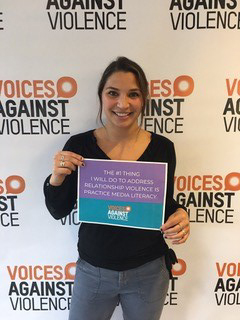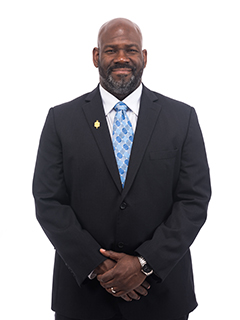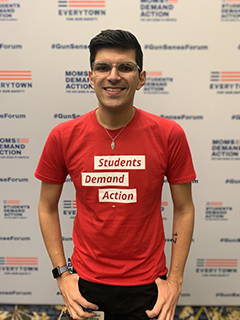Be the Change
Rachel Matos '16, G'21: Outreach and Prevention Manager, Voices Against Violence
What is most motivating about your work? Most challenging?
My role is broken into two missions: direct service and advocacy with those who have experienced domestic violence and sexual assault, and outreach and prevention. I oversee all of our prevention initiatives in the Metro West area of Massachusetts, and run workshops for audiences ranging from middle and high school students to public service groups such as firefighters, police departments, and school administrators. What is most motivating to me is that in every workshop I facilitate, I learn new things from the people I am trying to teach. I can also be super creative with my work when creating awareness campaigns within different communities. The most challenging part is breaking down the stigma of “This doesn’t happen here,” or “That issue isn’t a problem in this community.” One of the things that grounds my work is understanding the intersections of identity and survivorship, and root causes of violence. Understanding racism, ableism, and sexism is the framework of prevention education. For example, not every survivor will be comfortable calling the police or getting a restraining order; there has to be an understanding that different responses are so important to helping different people.
Why did you choose to go into public service and address this particular topic?
My First-Year Seminar (FYS) course was called “Exploring Activism.” It was there that I decided I wanted to work at the intersection of criminal justice and violence prevention. From there I spent my time at Lasell involved in campaigns and trainings, and discovered that I wanted to do violence/assault prevention and education. That side of the problem is like a puzzle that I am constantly figuring out: How do I prevent violence, and what does that mean for different community members? Advocacy work is incredibly important and involves constantly fighting fires. In my case, I wanted to go upstream in the system and prevent those conflicts from happening in the first place.
Can you imagine a future in which you don’t work in addressing issues of public health, safety, and justice?
I think this is my lifelong journey. I cannot picture myself doing anything but this kind of work. In this kind of work, it can sometimes feel like you need to go out and change the whole world. But, every time I work with a student that has a “lightbulb moment” of understanding what I’m trying to convey, it is so powerful. It is so important to remember that we can’t change the world in one day, but you can change one mind in one day. I sometimes look back on my life a few years ago when I entered the workforce and see how far I’ve come and how much further I’ll be able to go. The longer I invest myself in this work, the more good I can do for communities.
Din Jenkins G’19: CEO and Chief Facilitator, Supply The Why
What is most motivating about your work? Most challenging?
I founded Supply The Why to enable people and organizations to have difficult conversations around diversity, inclusion, and other hot-button topics. The most motivating part about launching Supply The Why has been the reaction from people who just want to talk about difficult issues without yelling, name-calling, or disrespectful, backhanded comments. They want good, fact-based conversations where, even if they disagree about what is being said, they can still part as friends. The most challenging part is to get people to understand what it is we are doing. It is so new and different, so there is a bit of salesmanship that has to go into it. There’s also the age-old struggle of work-life balance; I am also a full-time police officer, a husband, and a father of three, so there are a lot of factors at play to keep this working.
Why did you choose to go into public service and address this particular topic?
I was a school resource officer (SRO) at Stoughton High School. During that time, I built many strong relationships with students and staff. After the incident between George Floyd and Derek Chauvin, some of the students I met as the SRO, who are adults now, wanted to talk with a trusted member of law enforcement about their fears, concerns and anger. I feel fortunate that they thought of me. It gave me a chance to speak with them as a Black man, as a neighbor, and as a police officer in their town about my perspective. I was able to open their eyes, and likewise, they opened mine to things from their perspective. It was so powerful. I posted something about it on Facebook, and so many people commented that they would have loved to have been part of the conversation. People want to see those kinds of interactions based on the genuine desire to understand people and their journeys … and that was the start of Supply The Why.
Can you imagine a future in which you don’t work in addressing issues of public health, safety, and justice?
I cannot. It has been less than a year since I started Supply The Why, and the response has been unbelievable. We have thousands of followers and have branched out into providing customized panels and trainings on diversity, inclusion, and more. Though I am the CEO, I am also the chief facilitator. What that basically means is that I am a conversational tour guide and traffic cop. I put together panels or conversations depending on the topic, and I make sure that everyone gets close to equal talking time. I make sure that we stay on topic, and that I both foster and diffuse emotion as is necessary to make sure things don’t bubble over. There are very few places people can go where respect is the bottom line and the end goal isn’t to win or lose, but to seek understanding of others’ points of view. I am convinced that this is what I was put here to do.
Jay Franzone ’16: Organizing Associate, Students Demand Action, Everytown for Gun Safety
What is most motivating about your work? Most challenging?
Every day, I am motivated by my work with survivors of gun violence who pour their heart and soul into a future where others don’t have to experience what they have gone through. I also work with students who have never experienced gun violence but who felt its impact growing up amidst our country’s gun violence epidemic. They in particular see the disproportionate impact that gun violence has had on Black and Latinx communities.
In my work, there is a constant battle of important versus urgent; at the end of the day, everything is important, and everything is about living in a country free from gun violence. To that end, another challenging part of my job is understanding that I need to take care of myself and encourage our students to do that, too. That means taking breaks, spending time with family and friends, using vacation days even if it just means staying home … these are all things we need to do to unplug and take care of ourselves.
Why did you choose to go into public service and address this particular topic?
At the time of the mass shooting at Marjory Stoneman Douglas High School in Parkland, Florida, I was a middle school teacher in South Dallas. It hit me like a ton of bricks. After talking with my classroom of Black and Latinx students about why we do lockdown drills, I learned that they often heard gunshots in their everyday lives outside of school; further research told me how apparent gun violence is in those communities, and showed how disproportionate it was. Black Americans are 10 times more likely than white Americans to die by gun homicide. That didn’t sit well with me, and I couldn’t stay in the classroom when I had the ability to work to make our nation safer for everyone.
Can you imagine a future in which you don’t work in addressing issues of public health, safety, and justice?
No. I see glimmers of hope in our movement every day! We are at a point where gun safety is an issue that is talked about at every kitchen table across the country. In early April, President Biden announced a slew of executive actions on gun safety including actions on ghost guns, which are untraceable DIY firearms made from parts available without a background check. We are making a lot of progress; now we are working to ensure our elected leaders are giving us more than thoughts and prayers. I cannot see myself not working to address public health and justice. Now is the time to act. I love what I do, and yes, it is hard, but I work with the most passionate people in the world. To me, doing the right thing is enjoyable.



